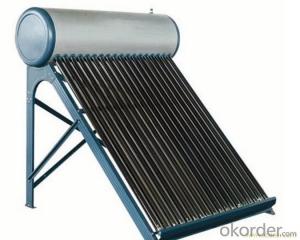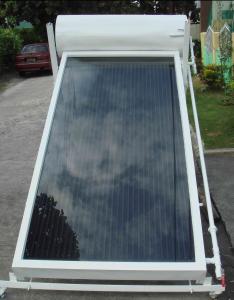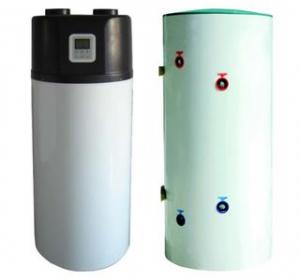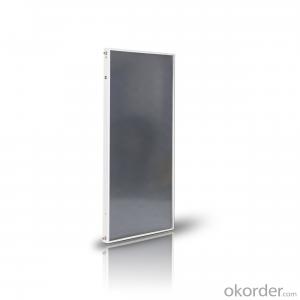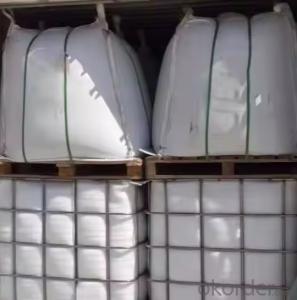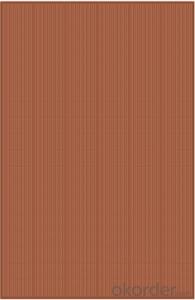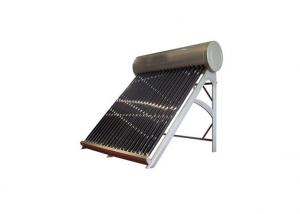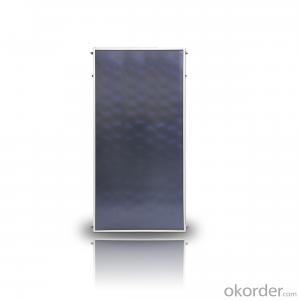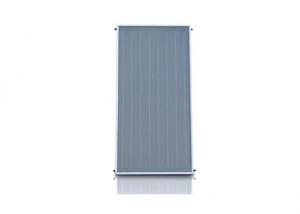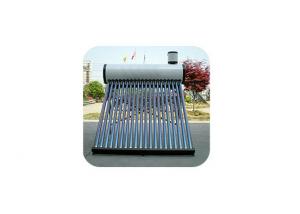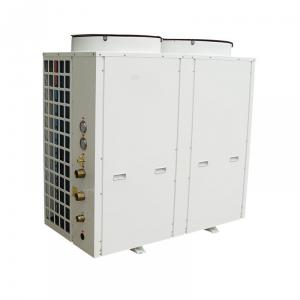Solar Collector Water Heater With Copper Coil New Designed
- Loading Port:
- China main port
- Payment Terms:
- TT OR LC
- Min Order Qty:
- 1 set
- Supply Capability:
- 6000 set/month
OKorder Service Pledge
OKorder Financial Service
You Might Also Like
Introduction of Non-Pressure Solar Water Heater:
Non-pressure Solar Heater is one of the most economical solar water heating device with pretty high efficiency at the same time. It consists of hot water storage tank, solar vacuum tubes with mouth plug in storage tank, and bracket supporting tank and tubes.When cold water in evacuated tubes is heated with solar irradiation, as the specific gravities of hot water and cold water are different, hotter water goes upward to storage tank and colder water goes downward to glass tubes. through this continuous circulation, the cold water in storage tank will be gradually heated till sunset.
Specialty:
1. High thermal performance and working temperature: the heat exchanging rate even in winter can up above 55%.
2. Heat collecting efficiency is at least 20% above common solar systems.
3. Work in all day and all season: no matter any corner of the world, this system can work well even -40℃ to avoid the tube freezing problem.
4. Reliability: No water following through the tube, so water scale can not generate and tube cracks could be avoided, the system still can keep working even with some damaged tubes.
5. It can connect with water tap and work automatically with pressure0.6Mpa, bring enjoyable washing experience.
6. Safety: P/T valve would release pressure and temperature to protect tank..
Technical Specification:
1. Outer tank material: SUS304 stainless steel or powder coated color steel
2. Inner tank material: 1.2mm thick SUS304 food grade stainless steel ( Optional material SUS316L)
3. Vacuum tube material: borosilicate glass 3.3; AL-SS-CU absorb coating, with copper heat pipe inside
4. Frame material: 1.2mm thickness stainless steel
5. Insulation material: 55mm thickness polyurethane
6. Suitable for mains pressure water(up to 8 bar/116psi)
7. Easy plug-in installation
8. Install the T/P valve on the pressurized tank
9. Seal material: Stabilized High Temperature Silicon
Outer tank material: SUS304 stainless steel or powder coated color steel
Inner tank material: 1.2mm thick SUS304 food grade stainless steel ( Optional material SUS316L)
Vacuum tube material: borosilicate glass 3.3; AL-SS-CU absorb coating, with copper heat pipe inside
Frame material: 1.2mm thickness stainless steel
Insulation material: 55mm thickness polyurethane
Suitable for mains pressure water(up to 8 bar/116psi)
Easy plug-in installation
Install the T/P valve on the pressurized tank
Seal material: Stabilized High Temperature Silicon
19. Vacuum Tube | 20. Size (mm) | 21. Φ47*1500 / Φ58*1800 / Φ70*2100 | |||||
22. Tube (pcs) | 23. 10 / 12 / 15 / 18 / 20 / 22 / 24 / 30 / 36 / 42 | ||||||
24. Material | 25. Borosilicate 3.3 glass, magnetron spluttering selective coating | ||||||
26. Coating | 27. Single-target AL-N/AL or Three-target AL/N-Cu-SS | ||||||
28. Water Tank | 29. Capacity | 30. 80L ~ 500L for hot water storage tank | |||||
31. Inner tank | 32. Food-grade stainless steel SUS304-2B / SUS316 | ||||||
33. Insulation | 34. High-density polyurethane foam with 70~80 hour heat preservation | ||||||
35. Tank shell | 36. Food-grade stainless steel SUS304-2B | ||||||
37. Bracket | 38. Shaped strong aluminum alloy structure adaptable for flat or slope roof | ||||||
39. Accessories | 40. Anti-aging silicon seals, Dustproof seals, Air-vent cap, Stainless screws | ||||||
41. Auxiliary Devices | 42. Assistant tank, Intelligent controller, Electrical heater, Magnesium anodes | ||||||
43. Tilt Angle | 44. 25 ~ 50° | ||||||
45. Water Output | 46. 45 - 95°C | ||||||
47. Hail Resistance | 48. Φ25mm diameter | ||||||
49. Model Number | 50. Solar Vacuum Tube | 51. Tank 52. Liter | 53. System 54. Liter | 55. Container Loading Qty /sets | |||
56. Size /mm | 57. Qty /pcs | 58. 20GP | 59. 40GP | 60. 40HQ | |||
61. VNS-58SA12-100 | 62. Φ58*1800 | 63. 12 | 64. 100 | 65. 132 | 66. 58 | 67. 119 | 68. 140 |
69. VNS-58SA15-130 | 70. 15 | 71. 130 | 72. 170 | 73. 54 | 74. 108 | 75. 131 | |
76. VNS-58SA18-150 | 77. 18 | 78. 150 | 79. 198 | 80. 43 | 81. 86 | 82. 105 | |
83. VNS-58SA20-170 | 84. 20 | 85. 170 | 86. 223 | 87. 40 | 88. 80 | 89. 97 | |
VNS-58SA24-200 | 24 | 200 | 263 | 35 | 70 | 85 | |
VNS-58SA30-250 | 30 | 250 | 329 | 28 | 56 | 68 | |
VNS-58SA36-300 | 36 | 300 | 395 | 23 | 47 | 57 | |
Products Show
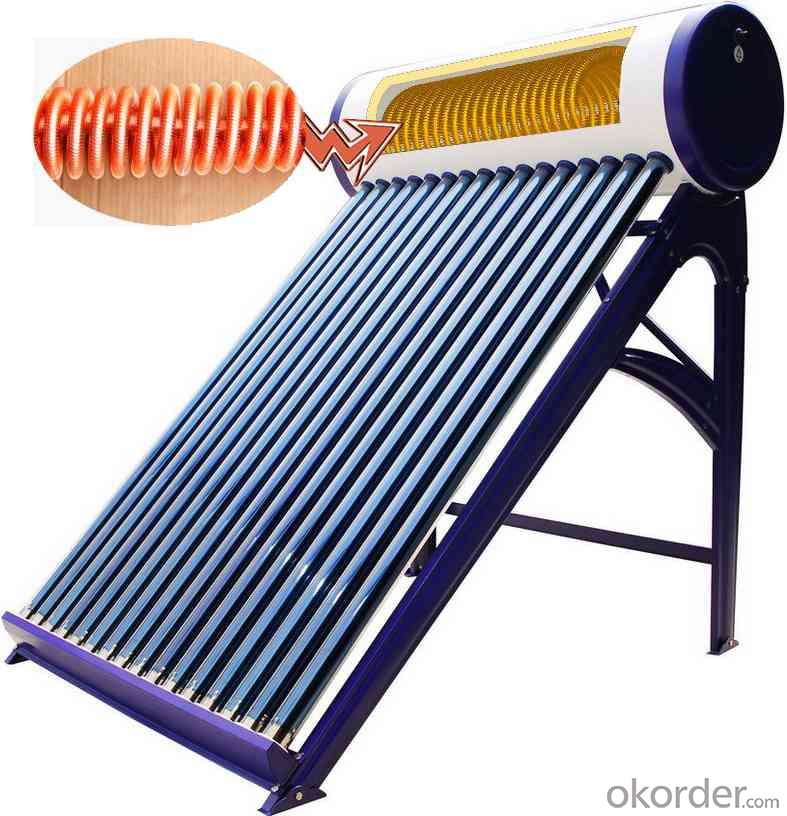
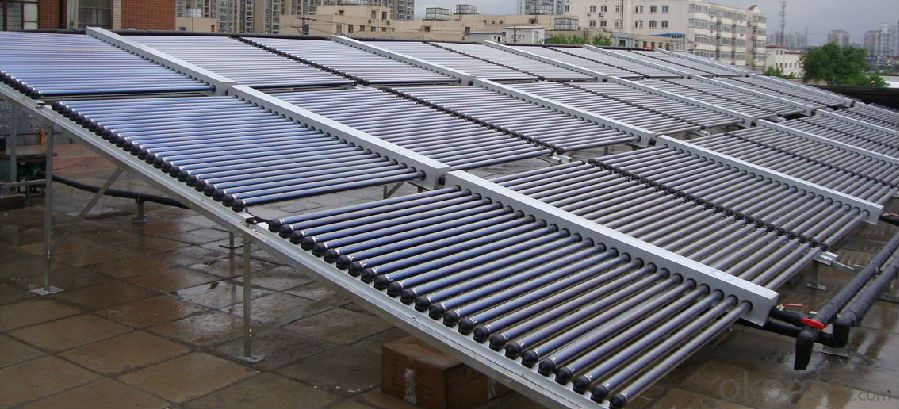
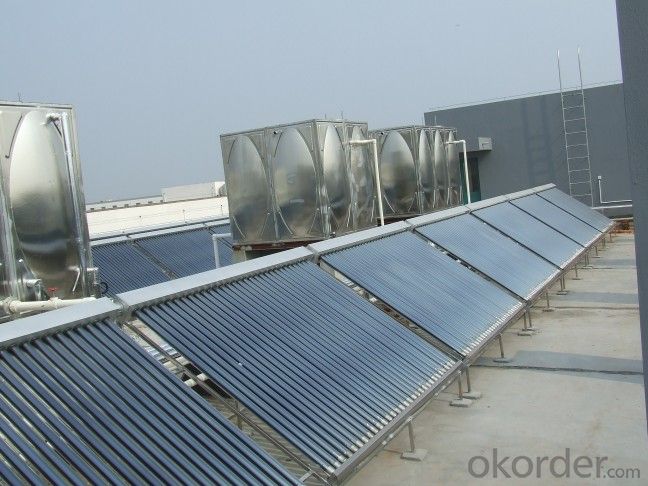
Our Services
1. OEM service
2. Warranty: 5 years
3. Considerable after sale service
Color steel Compact pressure Thermal solar heater
FAQ:
1. What’s the delivery time?
10 days after receiving deposit.
2. How long is the warranty?
5 years for whole system, 1 year for accessory
3. What’s your production capacity?
6000sets/month
4. What’s the MOQ?
1 set.
5. What’s your payment term?
Container: 30% T/T in advance for deposit, 70% T/T before shipment for fist order.
70% T/T after seeing copy of B/L from second order
Sample: 100% T/T in advance
Other choices: L/C at sight.
6. What certifications do you have?
CE, SOLAR KEYMARK, SRCC and etc.
- Q:Can a solar water heater be used in areas with limited water infrastructure?
- Areas with limited water infrastructure can still benefit from the use of solar water heaters. Unlike traditional water heaters, solar water heaters do not need a constant supply of running water. Instead, they utilize the sun's energy to heat water that is stored in a tank. As a result, even in areas where running water is scarce or unreliable, solar water heaters can still provide hot water for bathing, cooking, and cleaning. Moreover, solar water heaters can be designed with storage tanks that can hold heated water for extended periods, ensuring a continuous supply of hot water even when there is no sunlight. Therefore, solar water heaters offer a sustainable and practical solution for areas with limited water infrastructure, reducing their reliance on traditional water sources and promoting energy efficiency.
- Q:What is a solar water heater?
- A solar water heater is a device that harnesses the energy from sunlight to heat water for domestic or commercial use. It typically consists of solar collectors, which absorb and convert sunlight into heat, and a storage tank to hold the heated water. This renewable energy system is an eco-friendly alternative to traditional water heating methods, as it reduces reliance on fossil fuels and lowers carbon emissions.
- Q:What is the impact of chemical water treatments on the performance of a solar water heater?
- Chemical water treatments can have both positive and negative impacts on the performance of a solar water heater. On the positive side, using chemical water treatments can help prevent the buildup of mineral deposits and scale within the solar water heater system. This is important because these deposits can reduce the efficiency of the system by insulating the heat transfer surfaces and reducing the overall heat transfer rate. By preventing the formation of these deposits, the chemical water treatments can help maintain the performance and efficiency of the solar water heater over time. Furthermore, chemical water treatments can also help inhibit the growth of algae, bacteria, and other microorganisms within the system. These organisms can block the flow of water, clog pipes, and reduce the efficiency of the system. By using chemical treatments, these issues can be minimized or eliminated, leading to improved performance and longevity of the solar water heater. However, there can also be negative impacts associated with chemical water treatments. Some chemicals used in these treatments can be corrosive to certain materials commonly found in solar water heater systems, such as copper or aluminum. Over time, this corrosion can lead to leaks, reduced system lifespan, and increased maintenance requirements. Additionally, if the chemical water treatments are not properly monitored or maintained, they can lead to chemical imbalances in the water. This can result in damage to the solar water heater components, reduced performance, and potentially unsafe water for domestic use. Therefore, it is crucial to carefully follow manufacturer recommendations and regularly test and adjust the chemical levels to ensure proper balance and minimize any negative impact. In conclusion, chemical water treatments can have a significant impact on the performance of a solar water heater. When used correctly, they can help prevent mineral deposits, scale, and microbial growth, leading to improved efficiency and longevity of the system. However, it is important to be cautious and properly maintain the chemical balance to avoid any negative effects such as corrosion or chemical imbalances.
- Q:Can a solar water heater be used in areas with water scarcity?
- Yes, a solar water heater can be used in areas with water scarcity. Solar water heaters use the energy from the sun to heat water, reducing the reliance on traditional water sources. This makes them a suitable and sustainable option for areas where water scarcity is a concern, as they can help conserve water resources while still providing hot water for various needs.
- Q:How to choose solar water heater?
- In the thermal performance index, the higher the average daily efficiency is, the better the average heat loss coefficient is.2 home solar water heater is the key component of all glass evacuated solar collector tube (referred to as vacuum tube), the quality of vacuum tube directly affects the performance of the entire household solar water heater. Purchase should be carefully observed in the vacuum tube glass coating on the tube, the coating layer is called solar selective absorbing coating, because the factory production process, color coating will be different, but generally are black, dark blue or dark gray, good quality coating color uniformity film, no scratches, no peeling or shedding the phenomenon, no glass or stone section of tumor, supports the glass pipe in the correct place, not loose.
- Q:Can a solar water heater be used in combination with a water softener?
- Yes, a solar water heater can be used in combination with a water softener. The water softener helps to remove minerals and impurities from the water, which can prevent scaling and prolong the life of the solar water heater components.
- Q:How much sunlight is required for a solar water heater to work effectively?
- A solar water heater requires an adequate amount of sunlight to work effectively, typically around 4-6 hours of direct sunlight per day.
- Q:Can a solar water heater be used in areas with limited access to maintenance expertise?
- Yes, a solar water heater can be used in areas with limited access to maintenance expertise. Solar water heaters are generally low-maintenance systems that require minimal expertise to operate. They have few moving parts and are designed to be durable and reliable. However, it is essential to ensure proper installation and initial maintenance to maximize the system's performance and lifespan. Additionally, providing basic training and educational resources to users can help address any minor issues that may arise.
- Q:How does a solar water heater affect water heater system reliability?
- A solar water heater can improve the reliability of a water heater system by reducing its dependence on traditional energy sources, such as electricity or gas. This means that even during power outages or fuel shortages, the solar water heater can continue to heat water using free and abundant solar energy. Additionally, solar water heaters typically have fewer moving parts and simpler designs compared to conventional water heaters, resulting in fewer breakdowns and maintenance issues. Overall, the use of a solar water heater can enhance the reliability and longevity of a water heater system.
- Q:Are there any limitations on the placement of a solar water heater on a building with multiple units?
- Yes, there may be limitations on the placement of a solar water heater on a building with multiple units. Some potential limitations include: 1. Building regulations: Local building codes may dictate where solar water heaters can be installed on a building. These regulations may specify setback requirements, height restrictions, or other considerations that need to be followed. 2. Structural limitations: The building's structure may impose limitations on the placement of a solar water heater. For example, the roof may not be able to support the weight of the system, or there may not be enough space available for installation. 3. Shadowing issues: In a building with multiple units, neighboring structures or nearby trees may cast shadows that significantly reduce the amount of sunlight reaching the solar water heater. This can affect the system's efficiency and performance. 4. Ownership and consent: If the building has multiple units owned by different individuals or entities, obtaining the consent of all owners for the installation of a solar water heater may be necessary. Ownership agreements, homeowner association rules, or lease agreements may need to be considered. 5. Aesthetic considerations: The placement of a solar water heater may impact the overall appearance of the building. Some homeowners associations or local authorities may have guidelines or restrictions on the appearance of renewable energy systems. It is important to consult with a professional installer, local authorities, and any relevant building regulations to determine the specific limitations and requirements for placing a solar water heater on a building with multiple units.
1. Manufacturer Overview |
|
|---|---|
| Location | |
| Year Established | |
| Annual Output Value | |
| Main Markets | |
| Company Certifications | |
2. Manufacturer Certificates |
|
|---|---|
| a) Certification Name | |
| Range | |
| Reference | |
| Validity Period | |
3. Manufacturer Capability |
|
|---|---|
| a)Trade Capacity | |
| Nearest Port | |
| Export Percentage | |
| No.of Employees in Trade Department | |
| Language Spoken: | |
| b)Factory Information | |
| Factory Size: | |
| No. of Production Lines | |
| Contract Manufacturing | |
| Product Price Range | |
Send your message to us
Solar Collector Water Heater With Copper Coil New Designed
- Loading Port:
- China main port
- Payment Terms:
- TT OR LC
- Min Order Qty:
- 1 set
- Supply Capability:
- 6000 set/month
OKorder Service Pledge
OKorder Financial Service
Similar products
New products
Hot products
Hot Searches
Related keywords
